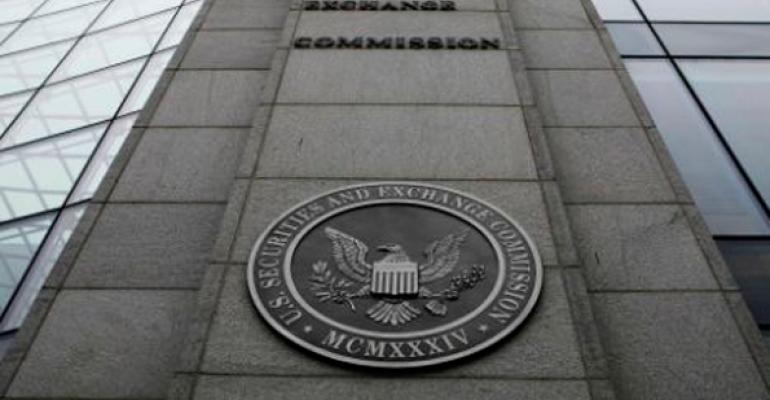Two Utah men convinced investors they had a high-yield securities trading algorithm one of the men claimed came from a “spiritual revelation," but in reality the pair were just ordinary con men who met in prison and cost investors about $11 million, according to the Securities and Exchange Commission.
In a complaint filed in Utah federal court last week, the SEC charged Thomas J. Robbins and Daniel J. Merriman, along with Clark J. Madsen and Mark W. Wiseman, of fraud and selling unregistered securities.
Starting in 2016, the commission charges, Robbins and Merriman allegedly carried out two related frauds, including the supposed divinely inspired high-yield trading program. They also solicited investors to purchase unregistered stock in ConTXT, a company they helped run, according to the complaint.
“The two schemes are interrelated for several reasons. First, Robbins and Merriman pitched both schemes to prospective investors at the same time. Thus, several investors are victims in both frauds,” the complaint read. “Second, Robbins and Merriman issued ConTXT stock to compensate investors who incurred losses in the trading program scheme and also sold ConTXT stock to fund the trading program.”
Robbins and Merriman initially met while they were incarcerated for unrelated convictions for securities fraud. In 2016, they reunited with a plan to begin a trading program for investors in August of that year.
In their pitches to investors, the duo said that Robbins had a “spiritual revelation” in 2008, a revelation yielding an “exclusive algorithm for trading currencies, commodities, indices, stocks, bonds, ETFs and other instruments.” However, they claimed they were initially stymied because technology did not catch up to this vision until three years later, according to the SEC.
The two also said they could generate positive returns of about 20% to 50% per month, and showed potential investors account projections boasting returns of 7.5% per week. Robbins and Merriman assured investors there was little risk in the program, and referenced their religious faith to attract investors; they asserted one of their clients was the Church of Jesus Christ of Latter-day Saints (this wasn’t true, according to the SEC).
Robbins also touted his supposed experience as an investment banker in Europe, boasting that he’d taken seven companies public, and had served as an advisor for, among others, the Rothschild family, the Kennedy family and the royal family of Thailand.
Robbins and Merriman allegedly found their clients through a network of “finders,” who were promised a significant percentage of "profits," and through social media. Some investors deposited their funds into a brokerage account, but others gave their money directly to the two men, and in some cases, neither Robbins nor Merriman made any effort to actually trade these funds. Instead, they used it for their own expenses or to pay off investments by previous clients, the SEC claimed.
“Since August 2016, every investor whose funds were traded by Robbins and Merriman lost virtually all of their money within a matter of weeks or months at the longest,” the complaint read. “Despite losing virtually all funds invested in the trading program, Robbins and Merriman told new prospective investors that they had consistently generated significant profits for their prior investors.”
During this period, the two men met Madsen and Wiseman, who ran the tech company ConTXT and rented offices in the same building as Robbins and Merriman. In Sept. 2016, Wiseman invested in their trading program, but both Wiseman and Madsen later learned of Merriman and Robbins’ securities fraud convictions and that many previous investors were upset they’d not been paid, according to the SEC complaint.
Nevertheless, Madsen and Wiseman partnered with Robbins and Merriman to raise funds to take ConTXT public, the SEC stated. The latter duo agreed to sell the stock to their investors and to generate money through their trading program, and by January 2018, Madsen and Wiseman granted Robbins and Merriman financial control of their company and officially authorized them to sell stocks and communicate with potential and current shareholders. While they operated as officers and directors of the company, the four men hid Robbins and Merriman’s roles in the company due to their prior convictions, according to the complaint.
Instead, they appointed Robert Whitaker as ConTXT’s secretary, treasurer and director, though Madsen said he would “just be a name on a paper,” with ConTXT employees describing him as a “puppet,” according to the SEC.
Robbins and Merriman continued to solicit investors with misleading statements about their trading program and their roles at ConTXT, with Madsen and Wiseman both aware, according to the commission. Meanwhile, investors’ funds continued to be used for repaying other investors, prior debt or personal expenses. According to the complaint, when investors confronted them, Robbins and Merriman issued them ConTXT stock as reimbursement. The SEC stated the two sold at least $942,800 of ConTXT stock in unregistered transactions during this time while distributing millions of company shares in order to meet debt obligations.
Though the defendants did not admit or deny allegations in the complaint, all four agreed to pay varying amounts of disgorgement, prejudgment interest and civil penalties. Additionally, Robbins pled guilty to securities fraud and money laundering in a criminal court action, and was sentenced to five years in prison and ordered to pay more than $10 million in restitution to affected investors, according to the SEC.





